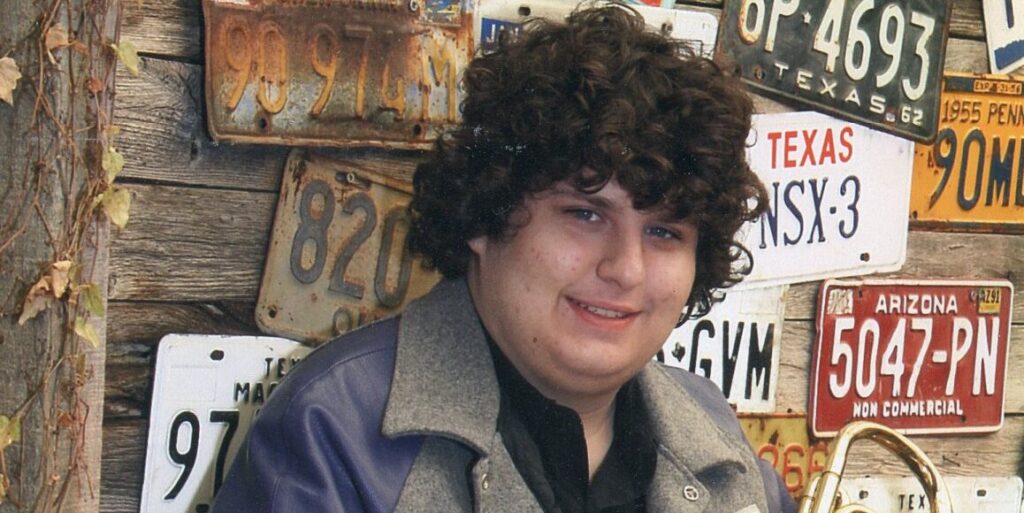
MDA Ambassador Guest Blog: Music is the Best Medicine
By Richard Fry | Wednesday, January 22, 2025
5 Second Summary
MDA Ambassadors play an essential role in furthering MDA’s mission while representing and empowering the neuromuscular disease community. Quest Ambassador Guest Blog series provides a platform to share their personal stories, perspectives, and experience.
Richard Fry is an aspiring writer and poet. He is first and foremost a musician. Through writing and folk music, Richard strives to inspire admiration for the innate beauty of brokenness and to shatter the illusion of perfection and normativity; to gild the fractures of our collective world rather than conceal them. A student of history and world literature in his spare time, if he does not have his nose buried in a book, you’ll likely find him cooking, enjoying a cappuccino, or playing the shrewd uncle to his niece and nephew.
“Ring out the old, ring in the new,
Ring, happy bells, across the snow:
The year is going, let him go;
Ring out the false, ring in the true.”
—Alfred, Lord Tennyson, “In Memoriam”, 104th canto
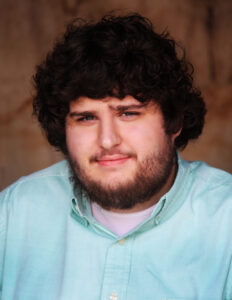
A portrait of the artist, Richard Fry, as a young man.
No less than the turning of the seasons, the new year is our stellar motivation to be prospective and retrospective in equal measure. It is our annual invitation to account all that is most dear to us, to discard that which does not gladden our lives, and in so doing renew ourselves that we might bring cheer to others. Fortunate though I have been to draw comfort from a number of depthless sources, it is music which has most made my life worth living. From a certain point of view, it was always meant to be music.
In retrospect, tracing back the thread of my musical lineage often makes the odyssey feel both predestined and perplexing. Save for my paternal uncle and his sons, musicianship didn’t necessarily blossom among my father’s family. On my mother’s side I can at least trace the musical seed back to a grandfather I never knew, a boozing balladeer as apt to pick and grin as grin and pick a fight. Indeed, the only tangible heirloom in our family was his battered (if intact) guitar, a J-50 bent to more blunt-force purposes than the Gibson Guitar Corporation surely intended. Roses can bloom in the desert, I suppose. And for as perplexing as I find the tuneful road which I’ve walked (and rolled), that I should be the one to possess his legacy comes as no surprise. I’m the only one to whom it means much more than a relic or an easy payout.
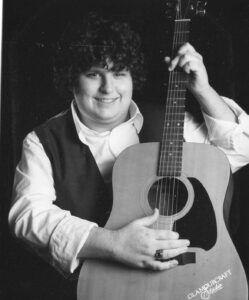
Richard Fry’s Senior Portrait with his guitar
Bear in mind, it wasn’t always guitars. For much of my childhood music was more diversional than vocational, something to fill the blank space between my sister’s soccer games. For a time, it wouldn’t have taken much convincing to admit that I simply didn’t like music beyond novelty artists like ‘Weird Al’ Yankovic. Not until my mother introduced me to the gospel of folk rock, bluegrass, and singer-songwriters like James Taylor and Jackson Browne did my horizons begin to broaden at breakneck speeds. Albeit, by then I was already a musician. Technically I had been so since I joined show choir in 5th and 6th grade to get out of P.E. and escape the ridicule I often faced for my sluggish, flabby body and awkward gait; the portents of regression, I later realized.
My music-making began in earnest, however, at thirteen when I took up the trombone with the school symphony, following after my sisters, the effortlessly proficient hornist and flautist that they were. For my own part, I was just good, neither arising to notable nor content with mediocre. Cutting my teeth on Holst and Stravinsky was the sort of optimal start any practitioner of the low brass could hope for, and—with practice beyond petty struggles for first chair—I might have dug out some professional niche down the line. But then I turned fourteen, and the world all at once modulated toward a stark and discordant key.
One too many falls to excuse for mere clumsiness, a frailty unbecoming an ostensibly healthy-yet-sedentary teenager, the enfeeblement didn’t start all at once, but it certainly accelerated at a dizzying tempo. It took all of thirty minutes for my first neurologist to suspect muscular dystrophy, and a muscle biopsy two years later yielded LGMD as the conductor of my newfound misery. The years that followed became something of an existential blur, occasionally punctuated by some new regressive milestone. And gradually the horn so carefully perched on my shoulder began to sag and sink toward the floor, my embouchure, diaphragm, and arms unable to keep up with lengthier and more complicated pieces. By the end of my senior year, I could barely hold my horn bell upright, let alone limp to class in sustained motion, and by turns I seemed to shed just about every friendship, craft, and joie de vivre I once possessed. LGMD was devouring everything I took solace in.
All except for literature, poetry—and music.
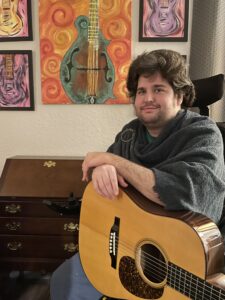
Richard Fry with his guitar named “Wade”
Somewhere between using music as a salve to my adolescent awkwardness and choosing to follow after my sisters in the school symphony, I had fallen under a sort of spell I wouldn’t comprehend for years to come. Not that I was cut out for music from the start or simply happened upon my passion; but because music stripped away all the pretense of my life, pierced through my melancholy armor, and seemed to speak to me—in turn, inviting me to speak—directly in a language which had no dilution, no deficiencies; only infinite bliss. It didn’t matter that my entire world started tumbling down when I was diagnosed with muscular dystrophy, because I had music to steady my fall and always would; one might even argue that you can no more leave behind such a magic than have it taken from you. Even when I could no longer hold my trombone up to my lips, I could channel my instrumentation into other means—choir, jazz orchestra, praise band, and, yes, guitars and adjacent instruments. For every one thing taken from me, the music returned twofold; and no matter what I lost, or what I gave up, the music never left. As though having foreseen the oncoming agony, a mandolin was in my hand the instant I learned of my mother’s untimely death, and a year later I sang something which moved my father to tears only hours before he himself passed on no less abruptly.
It was as though all my life music had been trying to communicate an elemental truth: that the theme and cadence of life can, and always will, change; still, the song carries on.
The bitter irony to life’s volatility, though, is that for me, and others like me, it is often a reality delineated (though not defined) by erosion; fortunately, a byproduct of this is that little lasts long enough to ever be taken for granted. Rust never sleeps, so says Neil Young, and I’m not so naïve as to think that my hands, or even my lungs, are immunized to atrophy or the passage of time. Yet even the inevitable loss of one’s music-making does not spell doom for those that reckon music for what it truly is. Consider this portion of the refrain to “Best Medicine” by The Stray Birds:
Well, if the body is a temple, the soul is a bell
And that’s why music is the best medicine I sell.
In no uncertain terms, music is not just the best medicine to an aching soul—it is the sincerest form of commiseration, an expression of a quality which no infirmity can encroach upon. We are drawn to music because the purest quintessence of our humanity is a note which yearns to resonate, bell-like, to the frequency of another.
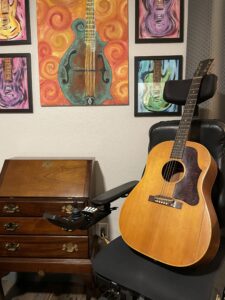
His grandfather’s J-50 guitar which is almost 70 years old.
Tacking back to my maternal grandfather, one of the reasons I feel a strange sense of predestination as a musician and the inheritor of his guitar is that, as my father was adopted, my mother’s side is the only genealogy which I have; in effect, the only lineage I can lay claim to. For forty years his guitar lay wrapped in a pair of pillowcases, tucked away in a closet, waiting. Waiting for me, as it should happen. In a strange stroke of fate, my maternal genetics are as responsible for my condition as my musicianship, malady and medicine—for myself, aye, but no less for others. To that end, I feel a sense of responsibility as a music lover to not only let the bell of my soul ring on without end, but, as a music-maker, be the bell which rings for another, however faintly.
So as this new year takes its hold, make time in life’s unceasing hurly-burly to reflect on what truly buoys your spirits and discard the whatnots which weigh you down. But don’t let the going of auld lang syne be for naught. In the words of folk singer Kate Rusby, let the old year’s shadow be a darkness from which to learn. Cast off the cruel and the sad. Make no room for fear in your heart; only the glad. Let your bells ring, and let the sun rise on a happy new year.
The engineers responsible for the following video were Russ Knight and Eric Tysinger, and production and venue were furnished by Spencer Baker and Rachel Fry, and Arborlawn UMC respectively.
Next Steps and Useful Resources
- For more information about the signs and symptoms of Limb Girdle muscular dystrophy (LGMD) , as well an overview of diagnosis and treatment concerns, an in-depth review can be found here.
- Browse MDA’s Mental Health Hub.
- MDA’s Resource Center provides support, guidance, and resources for patients and families. Contact the MDA Resource Center at 1-833-ASK-MDA1 or ResourceCenter@mdausa.org
- Stay up-to-date on Quest content! Subscribe to Quest Magazine and Newsletter.
Disclaimer: No content on this site should ever be used as a substitute for direct medical advice from your doctor or other qualified clinician.




